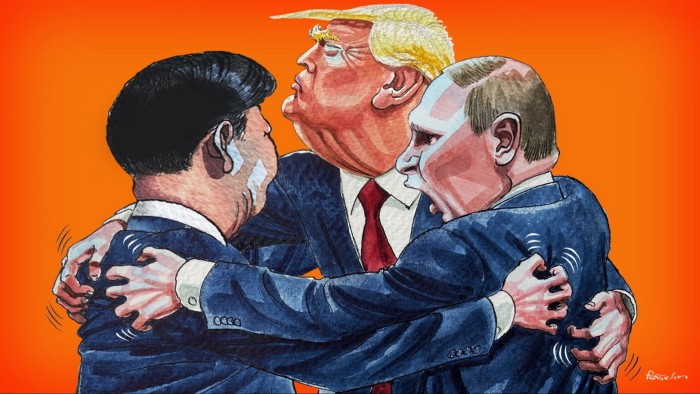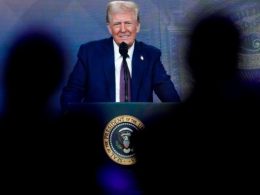Unlock the White House Watch newsletter for free
Your guide to what the 2024 US election means for Washington and the world
“The world must be made safe for democracy. Its peace must be planted upon the tested foundations of political liberty.” Those were the words of President Woodrow Wilson in April 1917 on the eve of America’s entry into the first world war.
More than a century later, Donald Trump has embarked upon a very different global mission. The US president is making the world safe for autocracy.
Trump’s assertion that Ukraine was responsible for its own invasion and that Volodymyr Zelenskyy is a dictator was a clarifying moment.
By aligning himself so perfectly with Kremlin propaganda, the US president demonstrated that Trump’s America is perfectly happy to see Russia win this war and crush Ukraine.
European and Ukrainian diplomats — excluded from the US-Russia talks — will continue to test whether it is possible to get America to support credible security guarantees for Ukraine. But Trump’s only remaining interest in Ukraine seems to be predatory — witness his demand that the country hands a large part of its mineral wealth to the US.
Recognising that money is one of the few things that truly motivates Trump, the Russians arrived at talks in Saudi Arabia with a long list of tempting business deals. Expect US sanctions on Russia to be lifted soon.
There are still some in Europe who are attempting to rationalise all this. They argue, on the basis of very little evidence, that Trump will not want Russia to win the war. Others claim that this is all part of a clever US manoeuvre to isolate China.
But the grim truth is that Vladimir Putin and Trump are united by their scorn for the European democracies. Earlier this month, Putin said that Trump would “restore order” in Europe and that European countries “will all stand at the feet of the master and will tenderly wag their tails”. Those remarks were reposted by Trump on social media.
As for China, Trump has expressed his admiration for Xi Jinping almost as often as he has fawned over Putin. He looks as if he wants to strike a deal with China’s strongman leader. So it seems entirely likely that Trump will eventually betray Taiwan just as surely as he has betrayed Ukraine.
The rumour mill in Washington is already buzzing with talk that the US will threaten to impose tariffs on Taiwan unless it agrees to sell a significant chunk of TSMC, the world-leading semiconductor company, to an American buyer. If the US can reduce its reliance on Taiwanese semiconductors, then the way would be open for America to abandon Taiwan.
A world in which Russia, China and the US are all hostile to liberal democracy is undeniably intimidating for Europeans. But while there is cause for alarm, there is no need for despair. European countries still have formidable resources with which to protect themselves — and are beginning to recognise reality and respond to it.
Friedrich Merz, who is poised to become Germany’s new chancellor after Sunday’s Bundestag elections, recently said: “We must prepare for the possibility that Donald Trump will no longer uphold Nato’s mutual defence commitment unconditionally.” Merz broke another taboo by suggesting Germany should talk to France and Britain about “nuclear sharing” — so that Germans are no longer dependent on the American nuclear weapons umbrella.
Europe’s weaknesses are well known: slow growth, high debts, small militaries, a slow-moving EU — and the rise of extremist parties that look to Putin and Trump.
But a united Europe also has formidable strengths that it needs to remember and call upon. The EU and the UK, put together, have an economy about 12 times the size of Russia’s. The EU is the world’s largest exporter of manufactured goods and services, and is a considerably larger trading power than the US.
Europe produces world-leading science. It has a strong industrial base. The fact that European countries follow the rule of law is crucial for business and will draw in investment, as the Trump administration’s contempt for the law becomes ever clearer.
Rapidly increased defence spending on a pan-European basis is entirely achievable. Co-operation between Britain, France and Germany is intensifying and can complement the slower-moving EU.
Europe feels dangerously isolated right now. But there is a network of advanced liberal democracies around the world that will want to work with Europe and the UK — including Japan, South Korea, Australia and Canada.
Europeans should also take heart from the thought that this dark period in the US will not last for ever. Liberal forces in the US are in retreat, but they have not disappeared. The recklessness and hubris of the Trump administration make it entirely possible that the Maga movement will blow up quite quickly.
The Europeans and their democratic allies around the world need to hold on — confident that in the end their values will prevail, as they have done in the past.
As Wilson put it in 1917: “We shall fight for the things which we have always carried nearest our hearts — for democracy, for the right of those who submit to authority to have a voice in their own governments, for the rights and liberties of small nations.”
America is on the wrong side of that fight for now. The EU and the UK can — and must — carry on the struggle.
Source link









